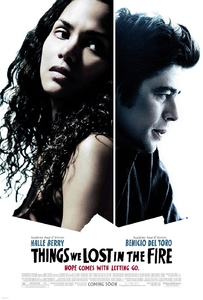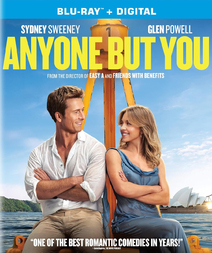

Interview: Danish director Susanne Bier goes Hollywood with Things We Lost in the Fire
Filed under: Interviews
The Hollywood landscape is ever-changing like those who populate it, and Hollywood is constantly looking for the next IT actor or IT director. In recent years, there has been a surge of people crossing over from the film communities in other countries. Be it the Asian directors of films like Ringu being hired to helm their American remakes or similar American genre pictures, or the trio of Mexican filmmakers Guillermo Del Toro (Pan's Labyrinth, Hellboy), Alexander Irraitu Gonazles (Babel, 21 Grams), and Alfonso Curan (Y'Tu Mama Tambien, Harry Potter, Children of Men), the landscape in Hollywood is certainly changing.
Poised to be the next award-winning director to make the transition is Denmark's Susanne Bier, nominated this past year at the Oscars for her film After the Wedding and previously behind the soon-to-be-remade Open Hearts and Brothers. Not even a year later, Bier was up in Vancouver shooting a feature produced by American Beauty director Sam Mendes for DreamWorks. The resulting film, Things We Lost in the Fire with Halle Berry and Benicio Del Toro, has been receiving some Oscar buzz and is a touching tale about loss, redemption, and the human spirit. I was lucky to have the chance to catch up with her by phone on a recent stop on the film's press tour.
Susanne Bier: Hello, how are you?
Mark McLeod: Hello, how's it going this afternoon?
SB: It's going well, thank you.
MM: I'd like to start off by finding out how you became involved with the project.
SB: I had read a number of scripts at that point, and most of them didn't really attract me, but then I read this one and I was really compelled by the fact it was written beautifully and it described some real life characters and not cartoon-like creatures that many of the other scripts described. I was very compelled and attracted by it and then I had a telephone conversation with Sam Mendes, who was going to be the producer, who bought the script. We had a real fun creative conversation and we played around with things like maybe Gary is going to be gay, real big stuff, and I really liked him. Then I met with DreamWorks and Marc Sourian and Adam Goodman, and they were equally supportive and interested, and from there it happened very quickly. On that same trip, I met with some actors, amongst them Halle Berry and Benicio Tel Doro, and then I kind of decided that it felt very right.
MM: Staying with that topic for a second, what do you look for when your choosing a project?
SB: I want to be touched by the script. I want to find it gripping or fun, and I want to be emotionally engaged in what I'm reading, and this script is one that certainly did that.
MM: In the past with your other films, you've worked as both a writer and director, while this one has been written by another writer. How involved were you with the screenwriting on Things We Lost in the Fire?
SB: We did a few drafts where he worked with my notes and re-wrote according to my notes.
MM: Before this, you've worked primarily in your native language of Danish, and now you've branched out into English cinema. Was it difficult making this jump as a director?
SB: Not really. Obviously at times, I do like to improvise a lot with the text, and at certain times I did feel more eloquent in Danish than I do in English, but I didn't find it difficult.
MM: So would you say it's just a different experience or is it something that really transcends the language boundaries?
SB: No, I really wouldn't say it was difficult, I have a pretty complete understanding of English and ever since I was a kid I've had a English cousin and she gave me a book when I was 10 or something. And ever since that I've been reading, and almost everything I read is in English. It feels very natural for me.
MM: Now you shot the film up here in Vancouver. What was the experience like filming in Hollywood North?
SB: It was great, I love it up there in Vancouver. It came as a shock to me how much I really liked the landscapes. I enjoyed the fact that you have this sort of urban setting and yet the nature like the beach is so close. I really enjoyed it up there and there's great sushi. (laughing)
MM: You shot the film with a lot of close-ups and in the scope aspect ratio. Why did you make that choice as a director?
SB: Not all of the film is close-ups, there are a lot of wide shots as well. There are a lot of close-ups but not all of the movie. When you look in the eye of somebody, you're looking in the soul and you're not looking at just the physical features. You can see from the image of the eye how a person feels, and it's a really important part of describing how they felt at that point.
MM: You mentioned Benicio Del Toro and Halle Berry earlier on. Were those always your first choices for the parts?
SB: I met them when I went to meet with DreamWorks, and I met with a lot of actors, and Halle and Bencio were amongst them. I pretty much decided right away that they would make for a great on-screen couple, and I liked each one of them for the part separately but also together. They are both very sexy and both very strong personailities that would make for a lot of tension and attraction, which would be really exciting for both me as a director and for the audience.
MM: A couple of your earlier films are being re-made in English by directors like Jim Sheridan. What do you think of the current Hollywood trend in taking recent hits in other languages and re-doing them for North American audiences?
SB: You know, I kind of understand it. Sometimes you feel with those stories that they are more universal (in) the content, and to do them in English might bring them to a bigger audience. It's odd also, and feels strange to see your babies brought up by a different set of parents, and you really hope that those new parents are going to take good care of the baby and that it will be happy, but it's still odd.
MM: Your earlier work was sort of the lower budget, Dogme style of filmmaking, whereas this film is obviously shot by a large crew and with all the usual trappings of a big studio project.
SB: I felt that the actual filmmaking was pretty much the same. I decided that I wasn't sort of going to be over impressed by the scale of suddenly making a big movie. And as a director, you're a storyteller, and I decided I was going to concern myself with telling the story and not be concerned about the many cars or the various kinds of weird food, the many people, the many makeup artists, hairdressers, etc. which is different from European filmmaking. I just really didn't pay much attention and went on with what I felt I should do, which was to tell the story.
MM: A lot of movies are coming out at the box office and they are all competing for the same limited audience. Why should people go see Things We Lost in the Fire?
SB: I think it's an extremely touching and gripping film. I think it's fun, and there are many many fun scenes in the film, and I think you actually leave the cinema wanting to talk about it and the characters and what's going to happen to them in the next year's time, and I think that's a very good reason for watching a movie. You don't often get that.
Tags: Susanne Bier, Things We Lost in the Fire, Denmark, Dogme, Vancouver
Related Posts
- Interview: Comic Gavin Matts coming back to Canada for a mini tour out west
- Winnipeg Comedy Fest Interview: Stand-up veteran Erica Sigurdson on making a career out of comedy and returning to the WCF
- Review: Serena
- The Supporting Act Podcast Ep. #038 with Graham Clark
- A Walkthrough of New Image College and New Image Entertainment
Mark McLeod has always loved film. In addition to his roles with ShowbizMonkeys.com, Mark also works on many film promotion projects in Vancouver, BC, through his company, Mark McLeod PR.


SBM on Social Media